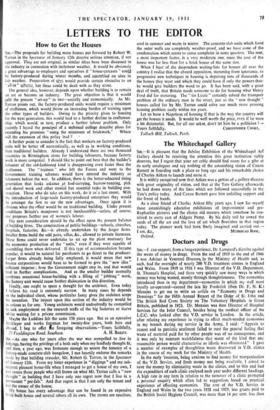LETTERS TO THE EDITOR
How to Get the Houses
SIR.—The proposals for building more houses put forward by Robert W. 1-arran in the Spectator of January 12th deserve serious attention, if not approval. They are not original, as similar ideas have been discussed in the industry in connection with inclement weather. It would be obviously a great advantage to employers and operatives if " house-carcases " could be factory-produced during winter months, and assembled on sites in lair weather. Preparation of sjten would provide certain obstacles to an
" " scheme, but these could be dealt with as they arose.
The general idea, however, depends upon whether building is to remain an art or become an industry. The great objection is that it would split the present " set-up " in two—socially and economically. As Mr. Tarran points out, the factory-produced units would require a minimum of craftsmen, which would throw an increasing burden of training upon the other types of builders. Owing to the priority given to housing for the next generation, this would lead to a further decline in craftsman- ship, which would, in turn, produce a further labour problem. Only recently I heard the principal of a technical college describe plans for extending his premises " using the minimum of brickwork." Where will the extension of this policy lead ? •
A further point to consider is the fact that workers on factory-produced units will be better off economically, as well as in working conditions, than traditional builders. Already I understand there are two thousand ...icancies in Birmingham alone for building labourers, because factory work is more congenial. I should like to point out here that the builder's labourer of the old-fashioned kind is disappearing even faster than the craftsman. The " trainees " who left the Forces and went to the Government training schemes would have entered the industry as labourers before the war. In addition, there is the better-educated rising generation that looks askance at hod-carrying, barrow-running, pick and shovel work and other menial but essential tasks in building con- struction. Those who do take on this work, do it as'a last resort. With the introduction of large-scale factory-produced enterprises they would he amongst the first to see the new advantages. Once again it is obvious what the effect would be on traditional building. Under present Londitions Britain's manpower is not inexhaustible—unless, of course, one proposes further use of women's labour.
The next consideration should be the effect upon the present balance of building firms. The construction of public buildings—schools, churches, hospitals, factories, 8cc.—is already undertaken by the larger firms. Smaller firms build the odd pairs, villas, &e., allowed to private licencees. These firms could never undertake to set up the plant necessary for the economic production of the " units," even if they were capable of assembling them when delivered. If this type of accommodation became popular, it would be natural for purchasers to go direct to the producer. Larger firms already being fully employed, it would mean that new finance corporations would have to be formed to give the " new idea " sufficient impetus ; here the Government might step in. and that would lead to further complications. And as the smaller builder normally combines occasional house-building with a filling of "jobbing " work, the factory unit would cause further dislocation in this direction.
Finally, one ought to spare a thought for the architect. Even today I believe his road is extremely narrow. In many cases he depends on the individual client, whose particular fancy gives the architect scope for invention. The impact upon this section of the industry would be as serious as for any. Young architects would undoubtedly be compelled to seek employment on the research staffs of the big factories or starve Whilst waiting for a private commission.
Maybe the Luddites felt the same 150 years ago. But as an operative bricklayer and works foleman for twenty-five years, both here and abroad, I beg to offer ffic foregoing observations.—Yours faithfully,


































 Previous page
Previous page